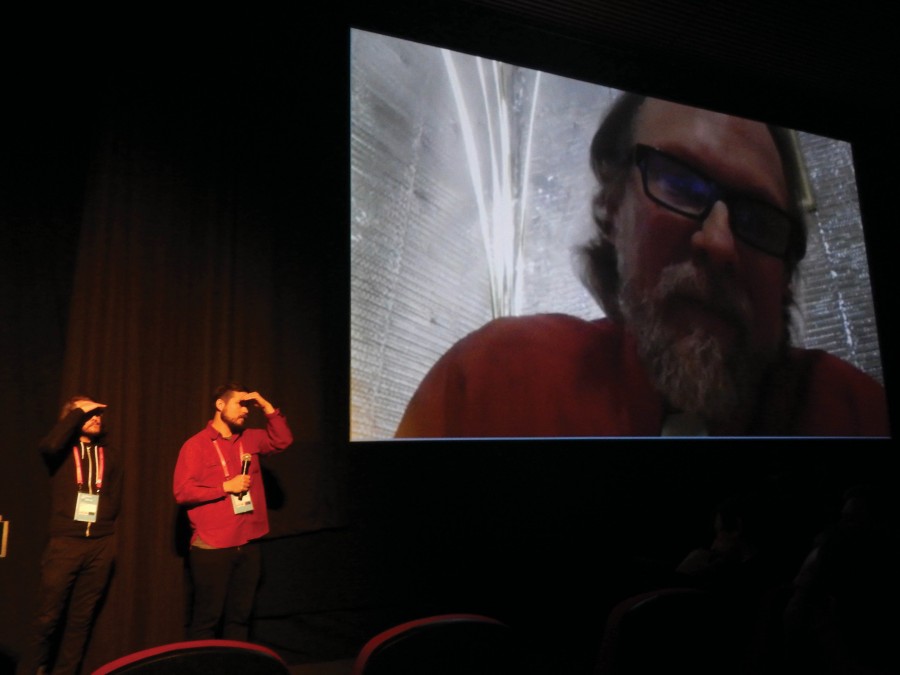Sundance review: Welcome to Leith
Walker, Nichols and Cobb during the post-viewing Q & A session.
Welcome to Leith, is a gritty piece of cinematic journalism that is meant to hurl the viewers into the center of an environment that is teetering on the edge of sanity, and about to topple into a pit of violence and anarchy. Directors Michael Beach Nichols and Christopher K. Walker made it a point to convey a sense of commonality between the residents of Leith, N.D. and viewers of the movie.
Leith is a city in Grant County, North Dakota, and according to the film, has a population of only 24 people. While to some, Leith may not qualify as a city, to the folks of Leith, and to similar cities, it has a unique charm and a “Small Town, USA” feel about it. The town doesn’t offer much in the form of entertainment, but the Leith Bar sits on Main Street and it is there that neighbors greet one another after a hard day of work and talk about the goings-on in town.
When Craig Cobb, a white supremacist, begins buying parcels of land in Leith and moves in, the quiet town starts spiraling into madness. At first he was treated as an awkward and strange old man, but soon he reveals his plan for Leith. With Cobb comes other well-known white supremacists and leaders of the National Socialist Movement, a Neo-Nazi party that is headquartered in Detroit, MI. Cobb also brings along Kynan Dutton, a wiry, young supremacist, to act as his enforcer of sorts, and help intimidate the people of Leith. Cobb’s ultimate goal is to turn the city of Leith into a haven for White Supremacists, taking the town’s small government by running out the small community. Needless to say, the directors are able to collect and capture footage of Cobb’s harassment of the residents, all of it culminating in a very tense and scary situation for the town.
Nichols and Walker refused to let the shock end there though, as they invited Cobb to attend the Sundance premiere via Skype to participate in the film’s Q & A session. This brought some laughter from the audience, but was quickly drowned out by the sea of booing and jeers. One lady even proclaimed that she “loved the film, but this [Cobb’s appearance] is disgusting.” Cobb’s answers to many of the questions were so absurd that it felt as if you had fallen to down the same hole as Alice.
The film is a cautionary tale for small cities like Lieth, and is reveals a culture that many would like to believe had died out by this time in our nation. It is an unsettling truth, but it is one that those who live within the boundaries of a civilized culture must be aware of.

Rob Bridenstine is the Editor-In-Chief of The Hawkeye.
Rob Bridenstine was born in Miami, Florida in 1990. He lived there for 12 years until moving...

Josh Brown is the Editor-in-Chief of Hawkeyewnews.net and the Videographer of The Hawkeye
Josh Brown was born in Detroit, Michigan. He moved...










Craig • Mar 14, 2015 at 6:49 am
Something of down-Alice’s-hole I clearly spoke that evening to the Neo Weimar, Rob Bridenstine: “The term ‘racism’ is designed to induce perceptional and moral destruction by preventing Whites from observing and discussing plain reality.”
Atlee Yarrow (@AtleeYarrow) • Mar 10, 2015 at 10:42 am
From several news accounts Craig Cobb lived in Leith for nearly one year without so much as a word. So here is my editorial change citing several newspapers of public knowledge and search ability, “but soon he reveals his plan for Leith”, would be factually correct to state, but soon the Southern Poverty Law Center visited the mayor of Leith to reveal Craig Cobb was planning to give away homes and land to white mothers with children who were looking for a better life.